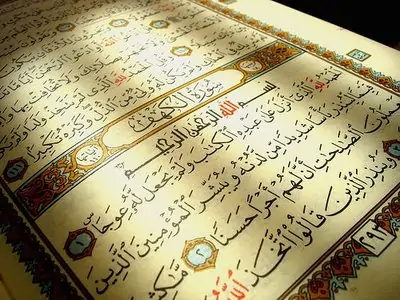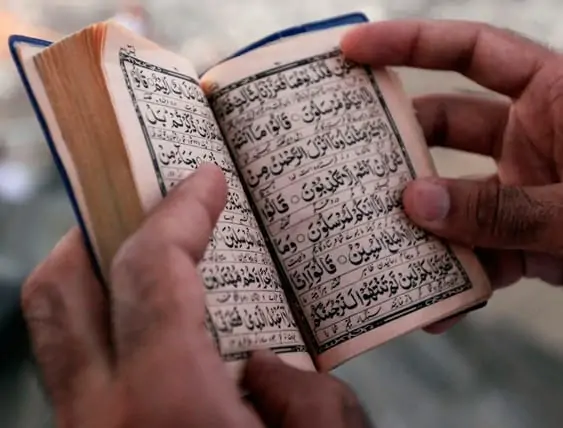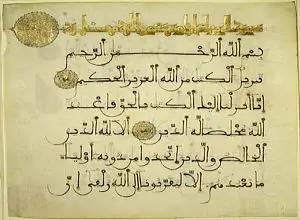The way the material of revelation was left by the Prophet (peace and blessings of Allah be upon him) at his death was the most suitable for the Companions in that:
- All parts of the revelation were available both in written form and memorised by the Companions (may Allah be pleased with them).
- All pieces were available on loose writing material, making it easy to arrange them in the proper order.
- The order already fixed of the ayah within the surat, in the written form, as well as in the memory of the Companions, and of the surahs in the memory of the Companions.
What arrangement could have been better than to have everything to hand in written form, as well as memorised by the Muslims, and to have the order and arrangement already determined, partially in the written form and completely in the memories of the people?
It is for these reasons that a later scholar, al-Harith al-Muhasibi in his book kitab fahm as-Sunan, summarized the first phase of the written collection of the Qur’anic material in the following words:
Writing of the Qur’an was no novelty, for the Prophet (peace and blessings of Allah be upon him) used to order that it be written down, but it was in separate pieces, on scraps of leather, shoulder blades and palm rips, and when Abu Bakr As-Siddiq ordered that it be copied from the various places to a common place, which was in the shape of sheets, these materials were found in the house of the Prophet (peace and blessings of Allah be upon him) in which the Qur’an was spread out, and he gathered it all together and tied it with a string so that nothing of it was lost. (Suyuti, Itqan, I, p. 58)
It is obvious that the history of the Qur’anic text (Text geschichte) cannot be compared with that of other Holy Scriptures. While the books of the Old and New Testaments, for example, were written, edited and compiled over long periods, sometimes centuries, the text of the Qur’an, once revelation had ceased, has remained the same till this day.
Suhuf and Mushaf

- Suhuf (sg. sahifa) means loose pieces of writing material, such as paper, skin, papyrus, etc.
- Mushaf (pl. masahif) means the collected suhuf, brought together into a fixed order, such as between two covers, into a volume.
In the history of the written text of the Qur’an, suhuf stands for the sheets on which the Qur’an was collected in the time of Abu Bakr As-Siddiq. In these suhuf the order of the ayah within each surah was fixed, but the sheets with the surahs on them were still in a loose arrangement, i.e. not bound into a volume.
Mushaf in the present context means the sheets on which the Qur’an was collected in the time of `Uthman ibn `Affan (may Allah be pleased with him).
Here both the order of the ayah within each surah as well as the order of the sheets were fixed.
Today we also call any copy of the Qur’an, which has both order of ayah and surahs fixed, a mushaf.
How the suhuf were made
Tradition informs us that at the Battle of Yamama (11/633), in the time of Abu Bakr As-Siddiq (may Allah be pleased with him),a number of Muslims, who had memorized the Qur’an were killed. Hence it was feared that unless a written copy of the Qur’an were prepared, a large part of the revelation might be lost.
The following is the account in the Sahih of al-Bukhari:
Narrated Zayd ibn Thabit Al-Ansari (may Allah be pleased with him), one of the scribes of the Revelation: ‘Abu Bakr sent for me after the casualties among the warriors (of the battle) of Yamama (where a great number of Qurra’ were killed).`Umar was present with Abu Bakr (may Allah be pleased with him), who said:
`Umar has come to me and said, the People have suffered heavy casualties on the day of (the battle of) Yamama, and I am afraid that there will be some casualties among the Qurra’ (those who memorized the Qur’an by heart) at other places, whereby a large part of the Qur’an may be lost, unless you collect it. And I am of the opinion that you should collect the Qur’an.
Abu Bakr added,
‘I said to `Umar , “How can I do something which Allah’s Apostle has not done?” `Umar said (to me) “By Allah, it is (really) a good thing”. So `Umar kept on pressing trying to persuade me to accept his proposal, till Allah opened my bosom for it and I had the same opinion as `Umar ‘.
(Zayd ibn Thabit added:)`Umar was sitting with him (Abu Bakr) and was not speaking. Abu Bakr said (to me), ‘You are a wise young man and we do not suspect you (of telling lies or of forgetfulness); and you used to write the Divine Inspiration for Allah’s Apostle. Therefore, look for the Qur’an and collect it (in one manuscript)’.
By Allah, if he (Abu Bakr) had ordered me to shift one of the mountains (from its place) it would not have been harder for me than what he had ordered me concerning the collection of the Qur’an. I said to both of them, ‘How dare you do a thing which the Prophet has not done?’
Abu Bakr said, ‘By Allah, it is (really) a good thing.’ So I kept on arguing with him about it till Allah opened my bosom for that which He had opened the bosoms of Abu Bakr and `Umar . So I started locating the Qur’anic material and collecting it from parchments, scapula, leafstalks of date palms and from the memories of men (who knew it by heart). I found with Khuzaima two verses of Surah At-Tawbah which I had not found with anybody else (and they were):
{Verily there has come to you an Apostle (Muhammad) from among yourselves. It grieves him that you should receive any injury or difficulty. He (Muhammad) is ardently anxious over you (to be rightly guided)} (At-Tawbah 9:128).

Here we can distinguish the following steps, which led to the preparation of the suhuf:
- Zayd ibn Thabit was instructed by Abu Bakr As-Siddiq (may Allah be pleased with him) to collect the Qur’an.
- Zayd ibn Thabit collected it from various written materials and the memories of people.
- The sheets thus prepared were kept with Abu Bakr, then`Umar ibn Al-Khattab,then Hafsah bint `Umar ibn Al-Khattab (may Allah be pleased with them all).

